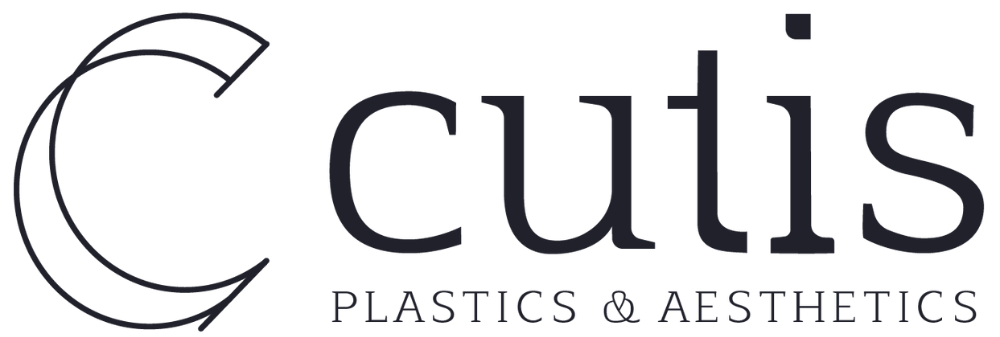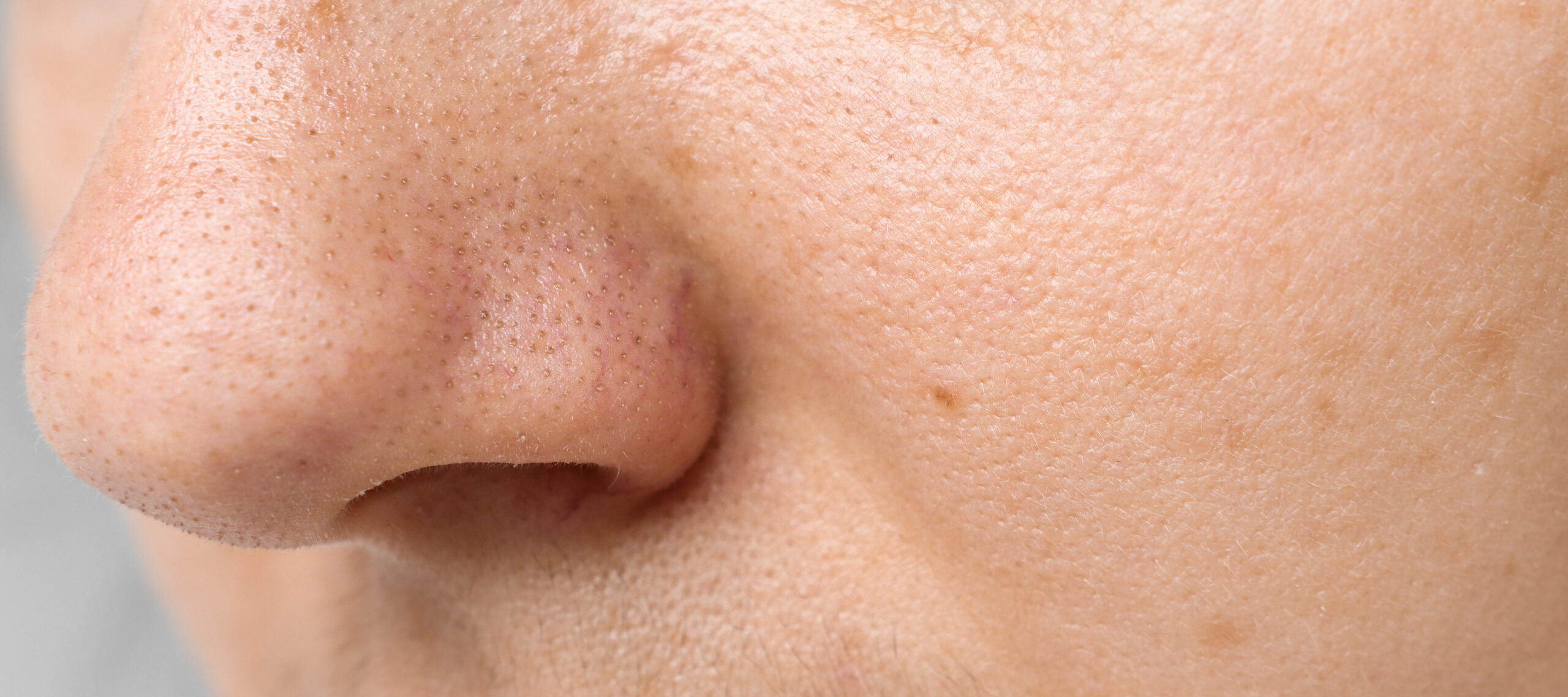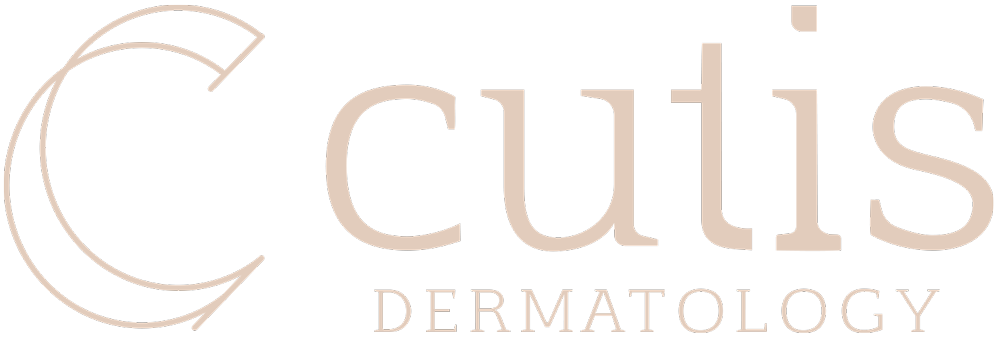What causes enlarged pores?
There are several factors that can contribute to the development of enlarged pores, including:
- Genetics: Some people are genetically predisposed to having larger pores.
- Hormonal changes: Hormonal fluctuations, such as during puberty or pregnancy, can cause an increase in oil production, which can lead to enlarged pores.
- Sun damage: Sun exposure can damage the collagen and elastin in the skin, leading to a loss of elasticity and the appearance of larger pores.
- Acne: Acne can cause inflammation, which can lead to the enlargement of pores.
- Age: As we age, our skin loses collagen and elastin, which can cause the pores to appear larger.
- Oily skin: Oily skin can cause pores to appear larger because of the accumulation of sebum in the pores.
- Using heavy, oily or thick makeup can clog the pores, leading to their enlargement.
It’s important to note that while it is possible to minimize the appearance of pores, it is not possible to permanently shrink them.
What are the best home remedies for enlarged pores?
There are several home remedies that may help reduce the appearance of enlarged pores, including:
- Topical retinoids: These are vitamin A-derived creams that can help unclog pores and reduce their appearance.
- Alpha hydroxy acids (AHAs): AHAs, such as glycolic acid, can help exfoliate the skin and reduce the appearance of pores.
- Salicylic acid: This is a type of beta hydroxy acid (BHA) that can help unclog pores and reduce their appearance.
- Benzoyl peroxide: This is an anti-inflammatory and antimicrobial agent that can help reduce the appearance of pores and prevent acne.
- Facial masks: Clay or charcoal masks can help draw out impurities and reduce the appearance of pores.
- Honey: Honey has antibacterial properties that can help unclog pores and reduce their appearance. Apply honey to your face and leave it on for 10-15 minutes before rinsing off.
- Witch Hazel: It can be used as a toner to help tighten pores and reduce their appearance.
- Clay Mask: Clay masks can help draw out impurities and reduce the appearance of pores.
It is best to consult with a dermatologist or skin care professional before trying any new treatments to determine the best course of action for your specific skin type and condition.
How do topical retinoids treat enlarged pores?
Topical retinoids are derived from vitamin A and are used to treat a variety of skin conditions, including acne and enlarged pores. These medications work by increasing cell turnover and promoting the production of collagen and elastin. This can help unclog pores and reduce their appearance.
Retinoids work by binding to retinoid receptors in the skin, which triggers a cascade of cellular events that lead to increased cell turnover. This helps to unclog pores and reduce the appearance of pores by removing dead skin cells. They also help to stimulate collagen production, which can help to thicken the skin and improve elasticity. This can lead to a reduction in the size of the pores and a more youthful and smooth appearance of the skin.
It’s important to note that retinoids can cause skin irritation and dryness, especially when you first start using them. It’s recommended to start with a lower concentration and use them every other night until your skin becomes acclimated. It’s also important to use sunscreen, as retinoids can make the skin more sensitive to sun damage.
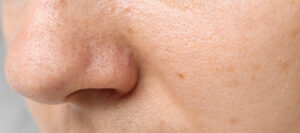
How does glycolic acid treat enlarged pores?
Glycolic acid is an alpha hydroxy acid (AHA) that is commonly used to treat a variety of skin concerns, including enlarged pores. It works by exfoliating the top layer of dead skin cells, which can help unclog pores and reduce their appearance.
Glycolic acid works by breaking down the bonds between dead skin cells, allowing them to be easily removed from the surface of the skin. This process, called chemical exfoliation, helps to unclog pores, remove impurities and dead skin cells, which can lead to a reduction in the size of the pores.
By removing the buildup of dead skin cells, glycolic acid also helps to stimulate collagen production, which can help to thicken the skin and improve elasticity. This can lead to a reduction in the size of the pores and a more youthful and smooth appearance of the skin.
Glycolic acid is typically used in concentrations ranging from 5-20% in skincare products. It is important to start with lower concentrations if you have sensitive skin, and gradually increase it. It’s also important to use sunscreen, as glycolic acid can make the skin more sensitive to sun damage.
What is benzoyl peroxide?
Benzoyl peroxide is a common ingredient found in over-the-counter acne treatments and is known for its ability to treat acne and reduce the appearance of enlarged pores. It is an anti-inflammatory and antimicrobial agent, which means it helps to reduce inflammation and kill the bacteria that can cause acne.
Benzoyl peroxide works by penetrating the pore and killing the acne-causing bacteria, Propionibacterium acnes (P. acnes). This can help to reduce the inflammation and redness associated with acne, and also help to unclog pores.
By reducing the amount of bacteria and inflammation in the pores, benzoyl peroxide can also help to reduce the size of the pores and improve the overall appearance of the skin. It can also help to prevent future breakouts by keeping the pores clear of impurities.
Benzoyl peroxide is typically used in concentrations ranging from 2.5-10% in skincare products, it is recommended to start with a lower concentration and gradually increase as your skin can tolerate it. It’s also important to use sunscreen, as benzoyl peroxide can make the skin more sensitive to sun damage.
Can I use witch-hazel if I have sensitive skin?
Witch hazel is generally considered to be safe for most skin types, including sensitive skin. However, it is always recommended to patch test before using any new product on your face, especially if you have sensitive skin.
How do we treat enlarged pores at Cutis Dermatology?
We approach pores from a scientific angle, this ensures that we treat the cause of enlarged pores, leading to predictable results. We have a wide variety of enlarged pore treatment options:
- Fraxel Laser
- Chemical Peels
- Pico Lasers
- Hybrid Laser
- Skin Care
- Dermal Toning
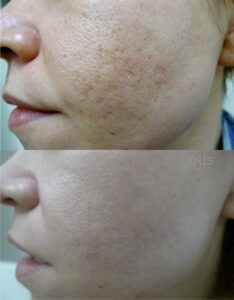
For this patient we used TCA and Fractional Lasers to treat her enlarged pores. Book a free* nurse consultation at our Brisbane clinics to discuss the best treatment options for your skin. *T&C applies
How do chemical peels help enlarged pores?
Chemical peels are a professional exfoliating treatment that can help reduce the appearance of enlarged pores. They work by applying a solution containing a specific type of acid, such as glycolic acid, lactic acid, or salicylic acid, to the skin. This solution causes the top layers of the skin to peel off, revealing the smoother, clearer and brighter skin underneath.
Chemical peels work by removing the outer layer of dead skin cells that can clog pores and make them appear larger. The process of exfoliation also stimulates collagen production which can thicken the skin and improve elasticity. This can help to reduce the size of the pores and improve the overall appearance of the skin.
Chemical peels are performed by nurses and dermal therapists and come in different levels of strength, from light to deep. Contact us to book!
What causes blackheads?
Blackheads are a type of acne that form when a clogged hair follicle, or pore, becomes filled with oil, dead skin cells, and bacteria. They are characterized by a dark or black appearance due to the presence of oxidized melanin, the pigment that gives color to our skin, hair and eyes.
The main cause of blackheads is an overproduction of oil, also known as sebum, in the skin. The sebum, along with dead skin cells, can clog the hair follicles, creating an ideal environment for the growth of the P. acnes bacteria. When the mixture of oil and dead skin cells is exposed to air, it oxidizes, turning it dark, hence the name “blackhead.”
Hormonal changes, such as during adolescence and pregnancy, can also contribute to the development of blackheads. Additionally, certain medications, such as birth control pills, androgen-related medications, and corticosteroids, can also lead to an increase in oil production and the formation of blackheads.
Certain lifestyle factors, such as poor diet, lack of sleep, and stress, can also contribute to the development of blackheads. Using heavy, oily or thick makeup can also clog the pores, leading to their enlargement and the formation of blackheads.
It’s important to note that while it is possible to treat and prevent blackheads, it is not possible to completely eliminate them. A good skincare routine, including cleansing, exfoliating, and the use of products that contain salicylic acid or benzoyl peroxide, can help to minimize their appearance.
How can you regulate oil production naturally?
There are several natural ways to regulate oil production and reduce the appearance of blackheads, including:
- Diet: Eating a diet rich in fruits, vegetables, and whole grains, while avoiding processed and high-fat foods, can help to regulate oil production and improve the overall appearance of the skin.
- Hydration: Drinking plenty of water can help to flush out toxins and keep the skin hydrated, which can help to reduce oil production.
- Exercise: Regular exercise can help to reduce stress levels, which can in turn help to regulate oil production.
- Sleep: Getting enough sleep can help to reduce stress levels and improve the overall health of the skin.
- Herbs: Some herbs, such as green tea and chamomile, have anti-inflammatory and antioxidant properties that can help to reduce oil production and improve the overall appearance of the skin.
- Tea tree oil: It has been shown to have antimicrobial properties, which can help to reduce the amount of bacteria on the skin, which can help to reduce oil production and prevent acne.
- Clay masks: Clay masks can help to absorb excess oil and impurities from the skin, which can help to reduce oil production.
It’s important to note that everyone’s skin is different, and what works for one person may not work for another.
